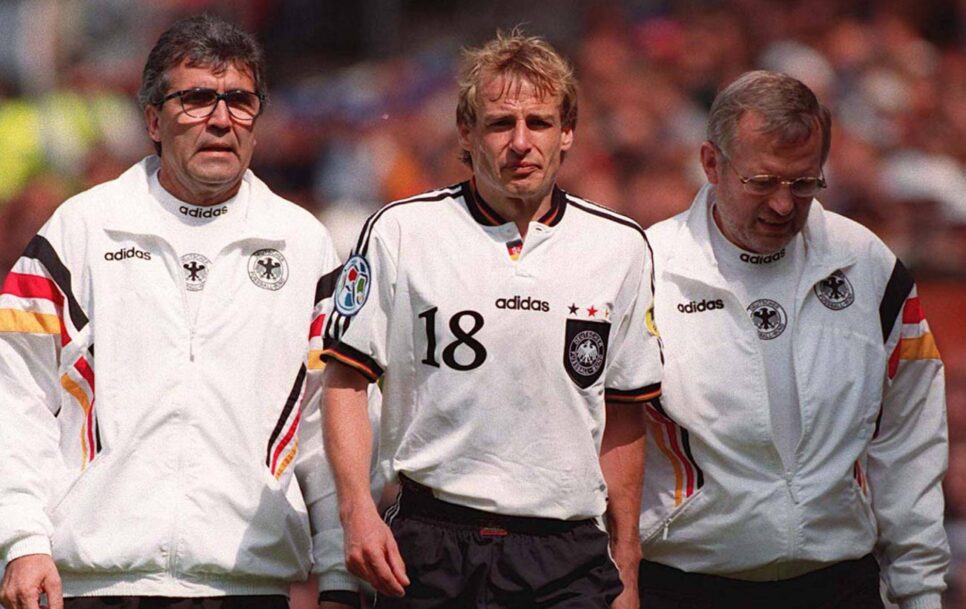Injuries at the Euros that flipped the script or shouldn’t have happened
No footballer wants to get injured, but sometimes the unexpected happens. This was the case for Germany’s central defender Antonio Rüdiger at this year’s Euros.
Rüdiger, who plays club football for Real Madrid, injured himself in the final group stage match against Switzerland while celebrating Niclas Füllkrug’s late equalizer. It is currently unclear if Rüdiger, who hurt his thigh, will be able to help his team in the round of 16 match against Denmark.
Rüdiger’s injury, while unusual, is far from the strangest in the football world. There have been numerous odd injuries, from Alex Stepney dislocating his jaw by yelling at his defenders to Darius Vassell drilling his toe.
Despite being unusual, Rüdiger’s injury is not the only one in Euros history that raised eyebrows. There are examples of players getting hurt while trying to tackle their opponents or legends of the game being injured due to the referee not protecting them.
Andoni Goikoetxea
During his nearly 20-year professional career, the central defender from the Basque Country earned the nickname “The Butcher of Bilbao.” Goikoetxea feared no one on the field, made no compromises, and was as aggressive as a bull seeing a red rag.
Goikoetxea was known for his powerful tackles both in national and club football. For example, in a 1983 Spanish league match, he brutally tackled none other than Diego Maradona. Two years earlier, Goikoetxea caused a severe knee injury to Bernd Schuster, from which the German never fully recovered.
Goikoetxea’s next moment of “glory” came in the final group stage match of the 1984 Euros between Spain and West Germany. Spain was under immense pressure, with Germany creating numerous scoring opportunities and hitting the crossbar and posts repeatedly. However, the score remained 0-0.
When Goikoetxea went to tackle the German star Rudi Völler from behind, no one could have predicted that this move would end the game for the defender. The tough Basque didn’t receive a red card, but he got injured and had to be replaced by Salva Garcia.
Despite Goikoetxea’s injury, the match ended well for Spain. They won 1-0, topped their group, and eventually reached the final, where they lost 2-0 to Michel Platini’s France.
It should be noted that Goikoetxea missed the decisive matches due to the injury sustained in the Völler incident.
Rinat Dasayev
Four years later, one of football’s best goalkeepers, Rinat Dasayev, found himself in a similar situation as Goikoetxea. In the second group stage match of the 1988 Euros against Ireland, the goalkeeper clashed twice with winger Anthony Galvin.
First, Dasayev forcefully upended the Irishman in the penalty area, got injured himself, but was relieved that the referee didn’t award a penalty. A few minutes later, the players collided again, and once more, Ireland couldn’t capitalize, as John Aldridge shot over the goal.
However, the second collision meant the end of the match for Dasayev due to an injury, and Viktor Chanov took his place between the posts.
While Goikoetxea’s tournament ended due to his injury, the iron-willed Dasayev was back in goal for the final group stage match against England.
With his help, the Soviet Union sailed into the final, where they lost 2-0 to the Netherlands. There, Dasayev conceded one of the most remarkable goals in Euros history when Marco van Basten volleyed the ball into the net from an almost impossible angle.
Jürgen Klinsmann
If Goikoetxea’s and Dasayev’s injuries could have been avoided by the players themselves, the incident involving Klinsmann in 1996 is a prime example of the crucial role referees play in protecting players’ health. Fortunately, this aspect has significantly improved in modern football.
Twenty-eight years ago, Germany’s great rival England hosted the Euros, and Klinsmann, along with his teammates, went unbeaten in the group stage, with the striker contributing two goals.
In the quarterfinals, Germany faced Croatia’s golden generation, led by attacking players Davor Šuker, Zvonimir Boban, Alen Bokšić, and Robert Prosinečki.
The Croatians targeted Klinsmann, playing very aggressively against him. The forward suffered numerous fouls in the first half, many of which would likely earn at least a yellow card in today’s game. However, in June 1996, Swedish referee Leif Sundell allowed the players to be very physical.
Klinsmann was substituted in the 40th minute due to a calf injury. Despite the Croatians managing to sideline the prolific scorer, it was Klinsmann who had the last word, as his penalty in the 20th minute helped secure a 2-1 victory for Germany, advancing them to the semifinals.
Klinsmann had to watch the famous semifinal against England from the bench, as doctors did not permit him to play. At the time, German media speculated that the striker, who had been crowned world champion six years earlier, might also miss the final.
However, an hour before the battle against Czechia, good news arrived: Klinsmann’s leg was fit enough to play! The German captain played the entire match, contributing significantly to his country’s triumph. It was Klinsmann who assisted Oliver Bierhoff in scoring the first golden goal in senior international football.







